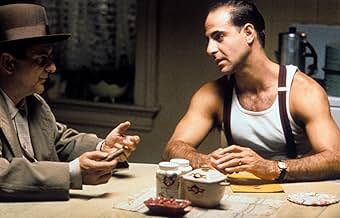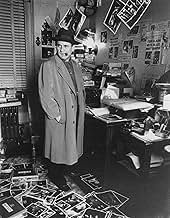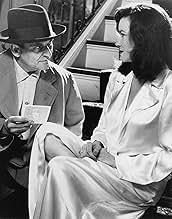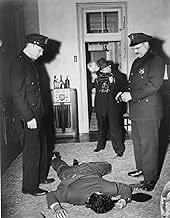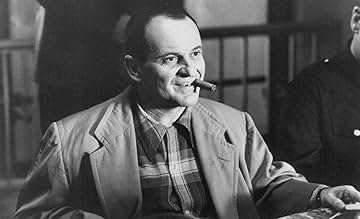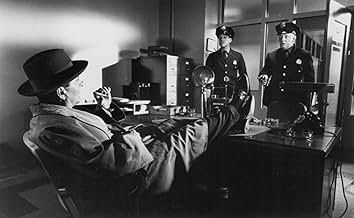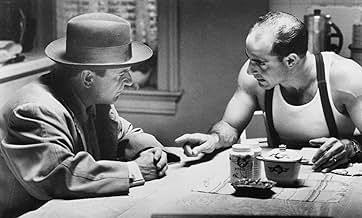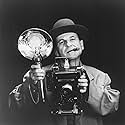IMDb-BEWERTUNG
6,5/10
4734
IHRE BEWERTUNG
Die Geschichte eines Fotografen aus den 1940er Jahren, der sich auf Verbrechen spezialisiert hat und erst jetzt damit beginnt.Die Geschichte eines Fotografen aus den 1940er Jahren, der sich auf Verbrechen spezialisiert hat und erst jetzt damit beginnt.Die Geschichte eines Fotografen aus den 1940er Jahren, der sich auf Verbrechen spezialisiert hat und erst jetzt damit beginnt.
- Auszeichnungen
- 1 Nominierung insgesamt
Christian Stolte
- Ambulance Attendant
- (as Christian Stolti)
Gian-Carlo Scandiuzzi
- Maitre D' - Cafe Society
- (as Gian-Carlo Scanduzzi)
Empfohlene Bewertungen
Joe Pesci plays the role of Leon "The Great Bernzini" Bernstein with accomplishment, as a kind of grubby, middle-aged everyman. Barbara Hershey, 44 when she made this movie, makes the screen sizzle by her mere presence as Kay Levitz. Pesci probably should have gotten an Oscar nomination for this performance, which is understated, sincere, and totally convincing. Some of the bit actors turn in good, solid performances with only a line or two.
The movie itself is heavy handed in spots, but director Franklin has written a number of movies and has a good ear for dialog. The mood of the piece is beautifully created and handled; camera work, lighting and music creating a real experience. The use of black and white sequences and inter-cutting of still photography is wonderfully handled. Maybe only a photographer can really appreciate the way Bernzini looks at the world as a photograph waiting to happen. People who are not willing to surrender to the experience of a movie will have less of a reaction to it.
The story is classic film noir, and more remarkable for being based on true events; blending together the great photographer Weegee (many of his photographs are actually used in the movie) and a gas-coupon scandal from the early days of American involvement in WWII. But, having said that, one misses the haunting quality this film conveys.
The movie itself is heavy handed in spots, but director Franklin has written a number of movies and has a good ear for dialog. The mood of the piece is beautifully created and handled; camera work, lighting and music creating a real experience. The use of black and white sequences and inter-cutting of still photography is wonderfully handled. Maybe only a photographer can really appreciate the way Bernzini looks at the world as a photograph waiting to happen. People who are not willing to surrender to the experience of a movie will have less of a reaction to it.
The story is classic film noir, and more remarkable for being based on true events; blending together the great photographer Weegee (many of his photographs are actually used in the movie) and a gas-coupon scandal from the early days of American involvement in WWII. But, having said that, one misses the haunting quality this film conveys.
This is a wonderful piece of work. The visual look of the movie is simply fantastic. But it should had been better if it was in black and white! In this case, Public Eye could be seen as a 1930's gangster movie. But the color of this movie looks like black and white. This film had anything I love about the Bogart, Robinson and Cagney movies. It's also give a chance to Joe Pesci to plays perhaps the role of his life. He's fabulous! Hard cigar smoking little guy ain't afraid of anything to have a good photography. He thinks big cities photos is art. He's also very moving, in the way Ernest Borgnine was in Marty, when he falls in love with wonderful Barbara Hershey. This is a great movie, one of the best American movie of the 1990's.
I picked this up at the local grocery never having heard about it before, I thought it was a comedy, it is not. Joe Pesci scores one for the little guy that nobody likes in a big way. There is one confusing thing however. Was that Walter Winchell he was supposed to be friends with? That part confused me. There was also something said about the American mob families working with the Italian mob families to overthrow Italy in the movie era 1942. Was that true? Over all I really enjoyed it and for once could not predict the outcome. If you want something a little different, this is it.
Movies should be able to transport you to the time and place without much effort. "The Public Eye" does so. I saw this in -- of all places -- a redeye bus trip from New York to DC, and this only enhanced the viewing enjoyment. This is definitely a movie to "get into the mood" for 40's noir, down to the gritty life of the City After Dark.
This one keeps getting overlooked as one of the best of the 90's. See this one.
This one keeps getting overlooked as one of the best of the 90's. See this one.
I was stunned by this movie when I saw it, because I'd never heard of it before and it was so excellent. Joe Pesci puts in possibly the best performance of his career, far different than many of his other roles (in other words, he doesn't play a little angry, cursing mobster). Another great actor, Barbara Hershey, also puts in a great performance. The film is directed with subtle but powerful artistry. There are actually themes in this movie! Metaphors! Basically, it's just plain great, but of course totally overlooked because it's not your typical overdone Hollywood film. My favorite scenes are these: the part in the middle of the gun battle when Pesci's character gets a gun pointed at his head, but can only respond by lifting up his camera and taking a picture, and the very final scene when Pesci's buddy tries to turn off his police scanner and he says, "You can't turn it off." A great film.
Wusstest du schon
- WissenswertesIt took Howard Franklin 10 years before he could get his screenplay turned into a film.
- PatzerWhen Kay leafs through Bernstein' photo album, there is picture of a New York City taxi with a rectangular roof light which displays not only the word "Taxi" but also whether the taxi is off duty and its medallion number. Those signs did not come into service until the 1960s. In the 1940s, when the movie is set, New York City taxis used a variety of curved roof lights used in most other cities.
- Zitate
Kay Levitz: It doesn't matter what people say unless you believe them.
- SoundtracksYou Can't Say No to a Soldier
(1942)
Music by Harry Warren
Lyrics by Mack Gordon
Performed by Sammy Kaye and His Orchestra
Courtesy of Sandy Hook Records
Top-Auswahl
Melde dich zum Bewerten an und greife auf die Watchlist für personalisierte Empfehlungen zu.
- How long is The Public Eye?Powered by Alexa
Details
Box Office
- Budget
- 15.000.000 $ (geschätzt)
- Bruttoertrag in den USA und Kanada
- 3.067.917 $
- Eröffnungswochenende in den USA und in Kanada
- 1.139.825 $
- 18. Okt. 1992
- Weltweiter Bruttoertrag
- 3.067.917 $
- Laufzeit1 Stunde 39 Minuten
- Farbe
- Seitenverhältnis
- 1.85 : 1
Zu dieser Seite beitragen
Bearbeitung vorschlagen oder fehlenden Inhalt hinzufügen



